中国餐桌礼仪常用英文表达
中国餐桌礼仪英语10句简单
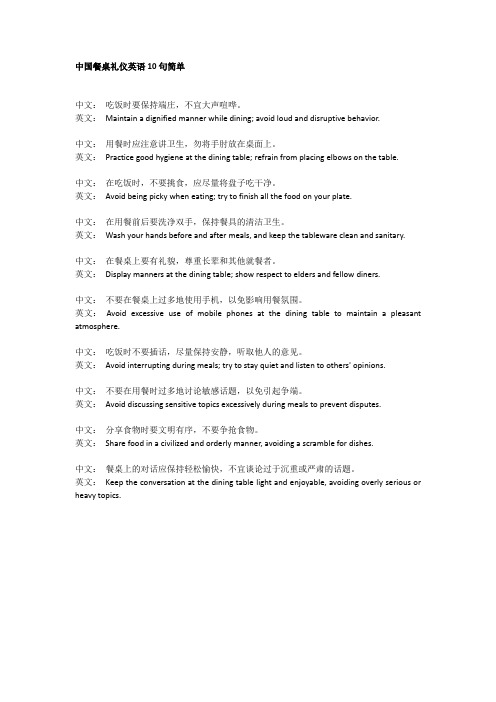
中国餐桌礼仪英语10句简单中文:吃饭时要保持端庄,不宜大声喧哗。
英文:Maintain a dignified manner while dining; avoid loud and disruptive behavior.中文:用餐时应注意讲卫生,勿将手肘放在桌面上。
英文:Practice good hygiene at the dining table; refrain from placing elbows on the table.中文:在吃饭时,不要挑食,应尽量将盘子吃干净。
英文:Avoid being picky when eating; try to finish all the food on your plate.中文:在用餐前后要洗净双手,保持餐具的清洁卫生。
英文:Wash your hands before and after meals, and keep the tableware clean and sanitary.中文:在餐桌上要有礼貌,尊重长辈和其他就餐者。
英文:Display manners at the dining table; show respect to elders and fellow diners.中文:不要在餐桌上过多地使用手机,以免影响用餐氛围。
英文:Avoid excessive use of mobile phones at the dining table to maintain a pleasant atmosphere.中文:吃饭时不要插话,尽量保持安静,听取他人的意见。
英文:Avoid interrupting during meals; try to stay quiet and listen to others' opinions.中文:不要在用餐时过多地讨论敏感话题,以免引起争端。
英文:Avoid discussing sensitive topics excessively during meals to prevent disputes.中文:分享食物时要文明有序,不要争抢食物。
关于中国国风俗和餐桌礼仪的英语

关于中国国风俗和餐桌礼仪的英语
以下是一些关于中国风俗和餐桌礼仪的英语表达:
Chinese customs and traditions 中国风俗和传统
Table manners in China 中国的餐桌礼仪
Dining etiquette in Chinese culture 中国文化中的用餐礼仪
Chinese food culture 中国饮食文化
Respect for elders at the table 餐桌上对长辈的尊重
Using chopsticks properly 正确使用筷子
Not speaking with your mouth full 在口中有食物时不说话
Saying "please" and "thank you" 说“请”和“谢谢”
Not making loud noises while eating 吃饭时不发出大的声音
Waiting for everyone to be seated before starting to eat 等待所有人就座后再开始用餐
Giving compliments to the host 对主人表示赞美
Not pointing at food with chopsticks 不用筷子指着食物
Not leaving your chopsticks upright in the rice bowl 不要将筷子竖直插在饭碗里Taking turns to speak and share during meals 用餐时轮流发言和分享
这些只是一些常见的表达,具体的风俗和餐桌礼仪可能因地区和文化背景而有所不同。
中国餐桌文化谚语英文
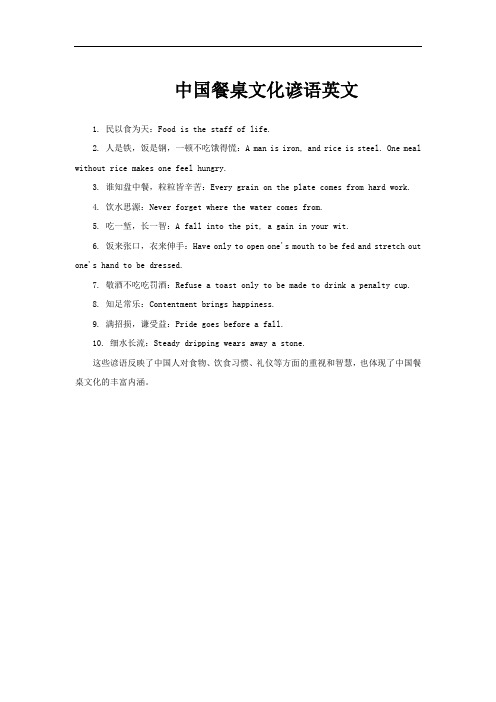
中国餐桌文化谚语英文
1. 民以食为天:Food is the staff of life.
2. 人是铁,饭是钢,一顿不吃饿得慌:A man is iron, and rice is steel. One meal without rice makes one feel hungry.
3. 谁知盘中餐,粒粒皆辛苦:Every grain on the plate comes from hard work.
4. 饮水思源:Never forget where the water comes from.
5. 吃一堑,长一智:A fall into the pit, a gain in your wit.
6. 饭来张口,衣来伸手:Have only to open one's mouth to be fed and stretch out one's hand to be dressed.
7. 敬酒不吃吃罚酒:Refuse a toast only to be made to drink a penalty cup.
8. 知足常乐:Contentment brings happiness.
9. 满招损,谦受益:Pride goes before a fall.
10. 细水长流:Steady dripping wears away a stone.
这些谚语反映了中国人对食物、饮食习惯、礼仪等方面的重视和智慧,也体现了中国餐桌文化的丰富内涵。
(完整版)中国餐桌礼仪英文版

Eat with little noise and movement
Help people to dish the serving chopsticks ,centiliter ,not use yours
Qing Dynasty by the impact of Western food, some Western rituals have also been introduced. Such as sub-dishes, on the soup, into the wine, etc, because of reasonable health way, it was introduced into the Chinese etiquette.
Had better not pick your teeth. If you must do it ,you should screen your mouth with napin or your hands
Leave the feast
When you leave the feast,you should show your thank to the master , or invite the master to your house here after.
Lead the guest to the seat of honor,then lead the senior to the seae next to the guest
Take the seat from left
Do not start eating in a hurry or make noise
中国餐桌礼仪英文介绍
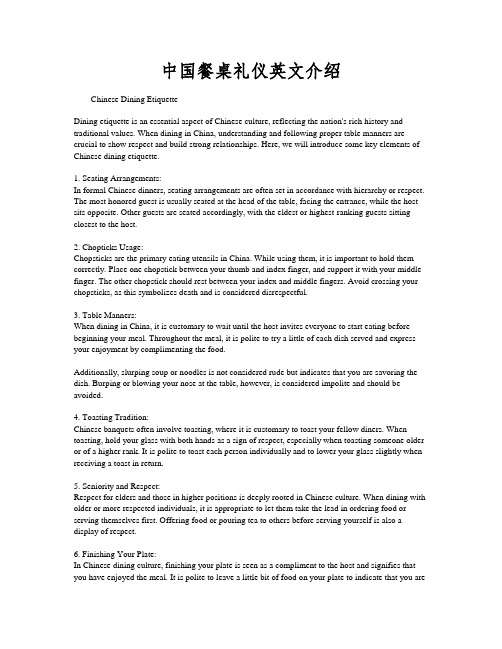
中国餐桌礼仪英文介绍Chinese Dining EtiquetteDining etiquette is an essential aspect of Chinese culture, reflecting the nation's rich history and traditional values. When dining in China, understanding and following proper table manners are crucial to show respect and build strong relationships. Here, we will introduce some key elements of Chinese dining etiquette.1. Seating Arrangements:In formal Chinese dinners, seating arrangements are often set in accordance with hierarchy or respect. The most honored guest is usually seated at the head of the table, facing the entrance, while the host sits opposite. Other guests are seated accordingly, with the eldest or highest-ranking guests sitting closest to the host.2. Chopticks Usage:Chopsticks are the primary eating utensils in China. While using them, it is important to hold them correctly. Place one chopstick between your thumb and index finger, and support it with your middle finger. The other chopstick should rest between your index and middle fingers. Avoid crossing your chopsticks, as this symbolizes death and is considered disrespectful.3. Table Manners:When dining in China, it is customary to wait until the host invites everyone to start eating before beginning your meal. Throughout the meal, it is polite to try a little of each dish served and express your enjoyment by complimenting the food.Additionally, slurping soup or noodles is not considered rude but indicates that you are savoring the dish. Burping or blowing your nose at the table, however, is considered impolite and should be avoided.4. Toasting Tradition:Chinese banquets often involve toasting, where it is customary to toast your fellow diners. When toasting, hold your glass with both hands as a sign of respect, especially when toasting someone older or of a higher rank. It is polite to toast each person individually and to lower your glass slightly when receiving a toast in return.5. Seniority and Respect:Respect for elders and those in higher positions is deeply rooted in Chinese culture. When dining with older or more respected individuals, it is appropriate to let them take the lead in ordering food or serving themselves first. Offering food or pouring tea to others before serving yourself is also a display of respect.6. Finishing Your Plate:In Chinese dining culture, finishing your plate is seen as a compliment to the host and signifies that you have enjoyed the meal. It is polite to leave a little bit of food on your plate to indicate that you aresufficiently satisfied.By following these Chinese dining etiquettes, you will not only show respect for the Chinese culture but also enhance your dining experience by enjoying the delicious cuisine. Remember, Chinese dining is not just about the food; it is about harmonious social interactions and building friendships.。
中国餐桌礼仪20条英语
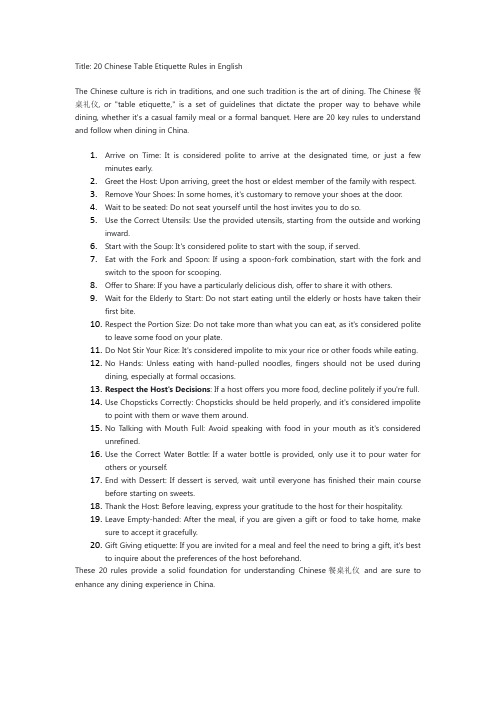
Title: 20 Chinese Table Etiquette Rules in EnglishThe Chinese culture is rich in traditions, and one such tradition is the art of dining. The Chinese餐桌礼仪, or "table etiquette," is a set of guidelines that dictate the proper way to behave while dining, whether it's a casual family meal or a formal banquet. Here are 20 key rules to understand and follow when dining in China.1.Arrive on Time: It is considered polite to arrive at the designated time, or just a fewminutes early.2.Greet the Host: Upon arriving, greet the host or eldest member of the family with respect.3.Remove Your Shoes: In some homes, it's customary to remove your shoes at the door.4.Wait to be seated: Do not seat yourself until the host invites you to do so.e the Correct Utensils: Use the provided utensils, starting from the outside and workinginward.6.Start with the Soup: It's considered polite to start with the soup, if served.7.Eat with the Fork and Spoon: If using a spoon-fork combination, start with the fork andswitch to the spoon for scooping.8.Offer to Share: If you have a particularly delicious dish, offer to share it with others.9.Wait for the Elderly to Start: Do not start eating until the elderly or hosts have taken theirfirst bite.10.Respect the Portion Size: Do not take more than what you can eat, as it's considered politeto leave some food on your plate.11.Do Not Stir Your Rice: It's considered impolite to mix your rice or other foods while eating.12.No Hands: Unless eating with hand-pulled noodles, fingers should not be used duringdining, especially at formal occasions.13.Respect the Host's Decisions: If a host offers you more food, decline politely if you're full.e Chopsticks Correctly: Chopsticks should be held properly, and it's considered impoliteto point with them or wave them around.15.No Talking with Mouth Full: Avoid speaking with food in your mouth as it's consideredunrefined.e the Correct Water Bottle: If a water bottle is provided, only use it to pour water forothers or yourself.17.End with Dessert: If dessert is served, wait until everyone has finished their main coursebefore starting on sweets.18.Thank the Host: Before leaving, express your gratitude to the host for their hospitality.19.Leave Empty-handed: After the meal, if you are given a gift or food to take home, makesure to accept it gracefully.20.Gift Giving etiquette: If you are invited for a meal and feel the need to bring a gift, it's bestto inquire about the preferences of the host beforehand.These 20 rules provide a solid foundation for understanding Chinese餐桌礼仪and are sure to enhance any dining experience in China.。
中国餐桌礼仪文化英文.doc

中国餐桌礼仪文化英文下面是我为大家整理的英文版中国餐桌礼仪加上翻译版哦!需要的参考以下。
中国餐桌礼仪文化英文版:1. admission etiquette. ask guests seated on the seats. please elderly guests in attendance were seated next to attendance at from the left side into the chair. admission dongkuaizi not after. what more do not come to beep. not to get up walk. if what happened to the owner notice. second, when the meal. ask guests. long the dongkuaizi. jiacai, each less. far from the food on their own eat some. meal not a voice. heshang also not a sound use kaitang i spoon a small drink and a small mouth. pawan front-lips not drink, soup, hot cool after zaikai. side not to drink while blowing some people prefer to chew food to eat. extraordinary feel like work is crisp chewing food, a very clear voices. this is not etiquette demands. extraordinary and everyone is eating together, as far as possible to prevent the emergence of this phenomenon.third: do not eat hiccup, other voices will not arise if there sneezing, changming involuntarily, such as the sound, it is necessary to say i am sorry.; i am sorry;. of the original cooler. within the words . to show regret.fourth if guests or elders give cloth dish. best use of chopsticks may also be the guests or elders far away from the dishes to their front, according to the habit of the chinese nation. dish is a one of the top. if thesame tables leadership, the elderly, the guests said. whenever of a new dish, let them first dongkuaizi. rotation or invite them to the first dongkuaizi. to show their importance.fifth: eat the head, fishbone, bones and other objects, not wangwaimian vomit, not onto the ground still. slowly to get their hands diezili, or close on their own or on canzhuobian prepared beforehand good on paper. sixth: to a timely manner about the time and people just a few humorous, to reconcile the atmosphere. guangzhaotou not eat, regardless of others, and do not devour and destroy the lavish meal, not jail sentence.7: it is best not to the dinner table tiya if it is to tiya, will use napkins or sign blocked their mouths.8: to clear the main tasks of the meal. must be clear to do business oriented. feelings or to the main contact. mainly or to eat. if it is the former, when attention should be paid to the seating arrangements. their main negotiators the seats near each other to facilitate conversations, or dredge emotion. if it is the after. need only pay attention to common-sense courtesy on the line, to focus on the appreciation of dishes,9: the last time left. must be expressed gratitude to the host. at the invitation of the owner or to their own homes after the house to show backchina is the etiquette of helping people, minsishiweitian, dining how can no rules! while stressing that no attention is three meals a day, but do not know know better than ok!1. inviting guests to notice, ruxi 6:00, 5:50才叫your elderly guests, it does not.2. hosts who looked to be late; guests should be 5-10 minutes late, and this is very considerate guests oh, and pay attention to grasp, natural host and the guest are huan.3. if sit round a table, facing the door of the main blocks, or back * walls, counters; emphasize some hotels will be used napkins distinction, the highest position napkins can not casually sit oh, unless you intend to good banquet woven?: d4. masters of the subject and object of the right hand side, the left hand side of the important guests; * gate facing the master, of course, is run errands entertain the peiqia sit you.5. guests do not directly to the members of a la carte and calling guidance, obediently waiting for the hosts who looked to be a la carte if guests really serious taboos or hobbies, and should be gently told the hosts who looked, the owner of natural putting his interests and meet guests little or significantly requirements.6. hosts who looked not need points or less grasping points, or holding food dishes, such as crab, lobster legs, ribs, and so on. for a meal to the three dishes such a rule no. what can be said etiquette!7. not a small amount of force will not object to others drink winewithout fragmentation feast!8. on the wine servings! foreigner likes to boast of skill, people may boast their own point-for the food, hosts who looked at carefully observed liangcai qi, every cup have drinks later, when immediately drank to welcome the start. . . like, rotating disk or right hand side indicate the subject and object moving first chopsticks. tuirang subject and object should not be too long, oh, we stomachs are hungry, it will eat you open! do not forget to eat the praise of some oh.9. after one of every dish, although the waiter and owner will still go before the subject and object, but not too rigidly stick with you, if just in front of me, dead people rotating disc, i would first folder a small taste of chopsticks !10. hosts who looked often to the disk will cater to the vast majority of guests; peiqia then added services to entertain; guests can not touch the hands of disk integrity and eat meals, the two sides are also huan you. 11. if there is no attendant at the food or chopsticks, gongbiao, jiacai the first time can be good, must not use their own chopsticks to pick in the session to pick, and even stirring! not everyone is like love, like you do not mind the saliva chopsticks! usually identified from their recent selection part.12. let chopsticks on the best food in their transition to a dish in only into the mouth. phase seem to be eating is not so urgent.13. when chewing food in the mouth, remember bijin lips is a major event, so to speak, falling objects, shishui spills, as well as to avoid a puma puma ji ji annoyance beep. 14. during the meal, or both before and after the meal, should be back straight, as far as possible but not later * chairs sit. during the meal, basically in the hands above the desktop. 15. the master of a very good appetite, and weight loss are guests, not the fanju oh.译:中国餐桌礼仪文化以下几点一.入座的礼仪.先请客人入座上席.在请长者入座客人旁依次入座,入座时要从椅子左边进入.入座后不要动筷子.更不要弄出什么响声来.也不要起身走动.假如有什么事要向主人打招呼.第二,进餐时.先请客人.长着动筷子.夹菜时每次少一些.离自己远的菜就少吃一些.吃饭时不要出声音.喝汤时也不要出声响,喝汤用汤匙一小口一小口地喝.不宜把碗端到嘴边喝,汤太热时凉了以后再喝.不要一边吹一边喝.有的人吃饭喜欢用咀嚼食物.非凡是使劲咀嚼脆食物,发出很清楚的声音来.这种做法是不合礼仪要求的.非凡是和众人一起进餐时,就要尽量防止出现这种现象.第三:进餐时不要打嗝,也不要出现其他声音,假如出现打喷嚏,肠鸣等不由自主的声响时,就要说一声真不好意思.;对不起;.请原凉.之内的话.以示歉意.第四;假如要给客人或长辈布菜.最好用公筷.也可以把离客人或长辈远的菜肴送到他们跟前,按我们中华民族的习惯.菜是一个一个往上端的.假如同桌有领导,老人,客人的话.每当上来一个新菜时就请他们先动筷子.或着轮流请他们先动筷子.以表示对他们的重视.第五:吃到鱼头,鱼刺,骨头等物时,不要往外面吐,也不要往地上仍.要慢慢用手拿到自己的碟子里,或放在紧靠自己餐桌边或放在事先预备好的纸上.第六:要适时地抽空和左右的人聊几句风趣的话,以调和气氛.不要光着头吃饭,不管别人,也不要狼吞虎咽地大吃一顿,更不要贪杯.第七:最好不要在餐桌上剔牙.假如要剔牙时,就要用餐巾或手挡住自己的嘴巴.第八:要明确此次进餐的主要任务.要明确以谈生意为主.还是以联络感情为主.或是以吃饭为主.假如是前着,在安排座位时就要注重.把主要谈判人的座位相互靠近便于交谈或疏通情感.假如是后着.只需要注重一下常识性的礼节就行了,把重点放在欣赏菜肴上,第九:最后离席时.必须向主人表示感谢.或者就此时邀请主人以后到自己家做客,以示回中国人乃礼仪之帮,民以食为天,用餐岂能没有规矩!虽然说讲不讲究都是一日三餐,但是知道总比不知道好吧!1。
餐桌上的礼仪(中英文对照)
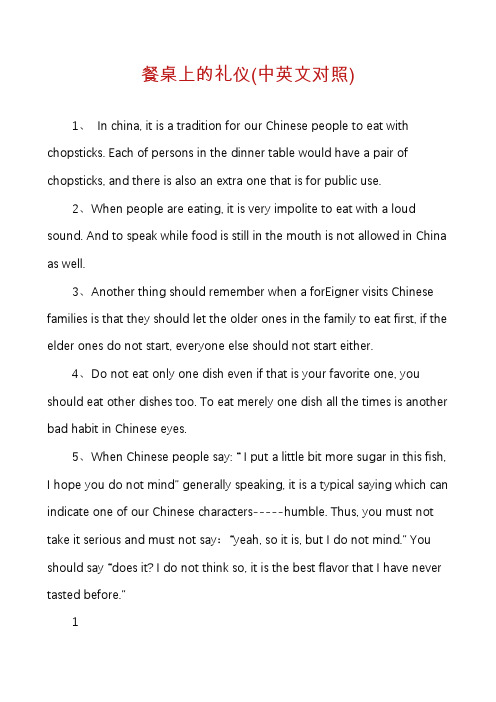
餐桌上的礼仪(中英文对照)1、In china, it is a tradition for our Chinese people to eat with chopsticks. Each of persons in the dinner table would have a pair of chopsticks, and there is also an extra one that is for public use.2、When people are eating, it is very impolite to eat with a loud sound. And to speak while food is still in the mouth is not allowed in China as well.3、Another thing should remember when a forEigner visits Chinese families is that they should let the older ones in the family to eat first, if the elder ones do not start, everyone else should not start either.4、Do not eat only one dish even if that is your favorite one, you should eat other dishes too. To eat merely one dish all the times is another bad habit in Chinese eyes.5、When Chinese people say: “ I put a little bit more sugar in this fish,I hope you do not mind” generally speaking, it is a typical saying which can indicate one of our Chinese characters-----humble. Thus, you must not take it serious and must not say:“yeah, so it is, but I do not mind.” You should say “does it? I do not think so, it is the best flavor that I have never tasted before.”1推荐第一,入座的礼仪。
- 1、下载文档前请自行甄别文档内容的完整性,平台不提供额外的编辑、内容补充、找答案等附加服务。
- 2、"仅部分预览"的文档,不可在线预览部分如存在完整性等问题,可反馈申请退款(可完整预览的文档不适用该条件!)。
- 3、如文档侵犯您的权益,请联系客服反馈,我们会尽快为您处理(人工客服工作时间:9:00-18:30)。
中国餐桌礼仪常用英文表达
Chinese table manners of families have no intrinsic quality even there are different region and position. No matter three meals a day or guest’s arrival, always bowls with chopsticks, food with soup. There is no rule for how to put the tableware. What people care about more are not the gorgeous tableware but the sumptuous food. People’s dining position reflects the most obvious etiquette of Chinese table manners. In ancient society, men are supreme, and women are not allowed to sit with men on the same table. Although this is modern society, this kind of ancient etiquette still remains. Today in China, the phenomenon that men sit on the table before women can be found everywhere. The master of a family usually sits on the first-class seat. The first-class seat is usually near the interior of a room facing to the door. Once there is a guest, the master will offer the first-class seat to the guest politely. If it is an ordinary meal of family, families should start after the elder. If there is a guest, the master offer the food to the guest is essential from the beginning to the end. And the tradition of urging others to drink is also a special phenomenon.
中国就餐举止家庭中国就餐举止没有内在质量甚而那里是另外区域并且安置。
问题三饭食每天或客人的到来,总不滚保龄球与筷子,食物用汤。
没有规则为了怎样能投入碗筷。
什么人关心关于更多是没有华美的碗筷,而是奢侈食物。
人的用餐的位置反射中国就餐举止最明显的`礼节。
在古老社会,人是至尊,并且妇女不允许坐与人在同一张桌。
虽然这是现代社会,这种古老礼节仍然依然存在。
今天在中国,人坐桌的现象,在妇女可以找到到处之前。
家庭的大师通常坐头等位子。
头等位子通常在面对对门的屋子的内部附近。
一旦有客人,大师为客人将礼貌地提供头等位子。
如果它是家庭一顿普通的膳食,家庭应该在长辈以后开始。
如果有客人,主要提议食物对客人对末端从开始是根本的。
并且敦促其他的传统喝也是一种特别现象。
1.让客人和长辈先吃每一道菜
let the elder people and the customer eat first
2.不要用筷子敲碗
don't use the chopsticks hit the bowl
3.不要将手伸到饭桌对面夹菜
don't reach to get the food on the opposite side 4.等大家到齐了,才开始吃
don't eat until everyone is there
5.为主人的长寿、健康、成功干杯
wish for the people who host the dinner
模板,内容仅供参考。
